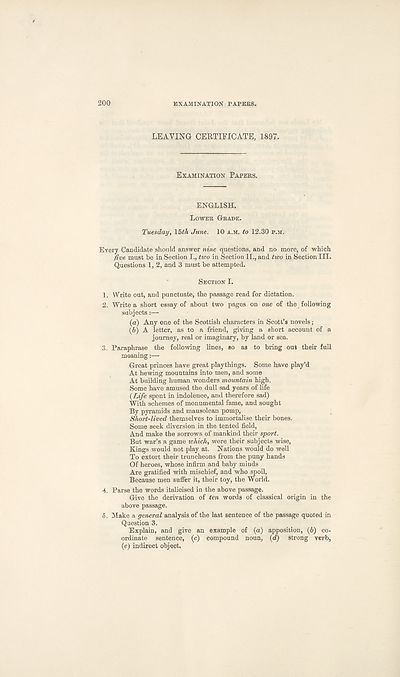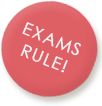Browse and search > 1897 - Leaving Certificate
(1) English, Lower Grade
Download files
Complete book:
Individual page:
Thumbnail gallery: Grid view | List view

200
EXAMINATION PAPERS.
LEAVING CERTIFICATE, 1897.
Examination Papers.
ENGLISH.
Lower Grade.
Tuesday, \hth June. 10 a.m. to 12.30 p.m.
Every Candidate should answer nine questions, and no more, of which
five must be in Section I., two in Section II., and two in Section III.
Questions 1, 2, and 3 must be attempted.
Section I.
1. Write out, and punctuate, the passage read for dictation.
2. Write a short essay of about two pages on one of the following
subjects:—
(а) Any one of the Scottish characters in Scott’s novels;
(б) A letter, as to a friend, giving a short account of a
journey, real or imaginary, by land or sea.
3. Paraphrase the following lines, bo as to bring out their full
meaning:—
Great princes have great playthings. Some have play’d
At hewing mountains into men, and some
At building human wonders mountain high.
Some have amused the dull sad years of life
(Life spent in indolence, and therefore sad)
With schemes of monumental fame, and sought
By pyramids and mausolean pomp,
Short-lived themselves to immortalise their bones.
Some seek diversion in the tented field,
And make the sorrows of mankind their sport.
But war’s a game which, were their subjects wise,
Kings would not play at. Nations would do well
To extort their truncheons from the puny hands
Of heroes, whose infirm and baby minds
Are gratified with mischief, and who spoil,
Because men suffer it, their toy, the World.
4. Parse the words italicised in the above passage.
Give the derivation of ten words of classical origin in the
above passage.
5. Make a general analysis of the last sentence of the passage quoted in
Question 3.
Explain, and give an example of (a) apposition, (6) co¬
ordinate sentence, (c) compound noun, (d) strong verb,
(e) indirect object.
EXAMINATION PAPERS.
LEAVING CERTIFICATE, 1897.
Examination Papers.
ENGLISH.
Lower Grade.
Tuesday, \hth June. 10 a.m. to 12.30 p.m.
Every Candidate should answer nine questions, and no more, of which
five must be in Section I., two in Section II., and two in Section III.
Questions 1, 2, and 3 must be attempted.
Section I.
1. Write out, and punctuate, the passage read for dictation.
2. Write a short essay of about two pages on one of the following
subjects:—
(а) Any one of the Scottish characters in Scott’s novels;
(б) A letter, as to a friend, giving a short account of a
journey, real or imaginary, by land or sea.
3. Paraphrase the following lines, bo as to bring out their full
meaning:—
Great princes have great playthings. Some have play’d
At hewing mountains into men, and some
At building human wonders mountain high.
Some have amused the dull sad years of life
(Life spent in indolence, and therefore sad)
With schemes of monumental fame, and sought
By pyramids and mausolean pomp,
Short-lived themselves to immortalise their bones.
Some seek diversion in the tented field,
And make the sorrows of mankind their sport.
But war’s a game which, were their subjects wise,
Kings would not play at. Nations would do well
To extort their truncheons from the puny hands
Of heroes, whose infirm and baby minds
Are gratified with mischief, and who spoil,
Because men suffer it, their toy, the World.
4. Parse the words italicised in the above passage.
Give the derivation of ten words of classical origin in the
above passage.
5. Make a general analysis of the last sentence of the passage quoted in
Question 3.
Explain, and give an example of (a) apposition, (6) co¬
ordinate sentence, (c) compound noun, (d) strong verb,
(e) indirect object.
Set display mode to:
![]() Universal Viewer |
Universal Viewer | ![]() Mirador |
Large image | Transcription
Mirador |
Large image | Transcription
Images and transcriptions on this page, including medium image downloads, may be used under the Creative Commons Attribution 4.0 International Licence unless otherwise stated. ![]()
| Scottish school exams and circulars > Leaving Certificate > (1) English, Lower Grade |
|---|
| Permanent URL | https://digital.nls.uk/143841028 |
|---|---|
| Shelfmark | P.P. 1897 XXIX |
|---|---|
| Attribution and copyright: |
|
| Description | Examination papers for the School Leaving Certificate 1888-1961 and the Scottish Certificate of Education 1962-1963. Produced by the Scotch (later 'Scottish') Education Department, these exam papers show how education developed in Scotland over this period, with a growing choice of subjects. Comparing them with current exam papers, there are obvious differences in the content and standards of the questions, and also in the layout and use of language |
|---|---|
| Additional NLS resources: |
|


